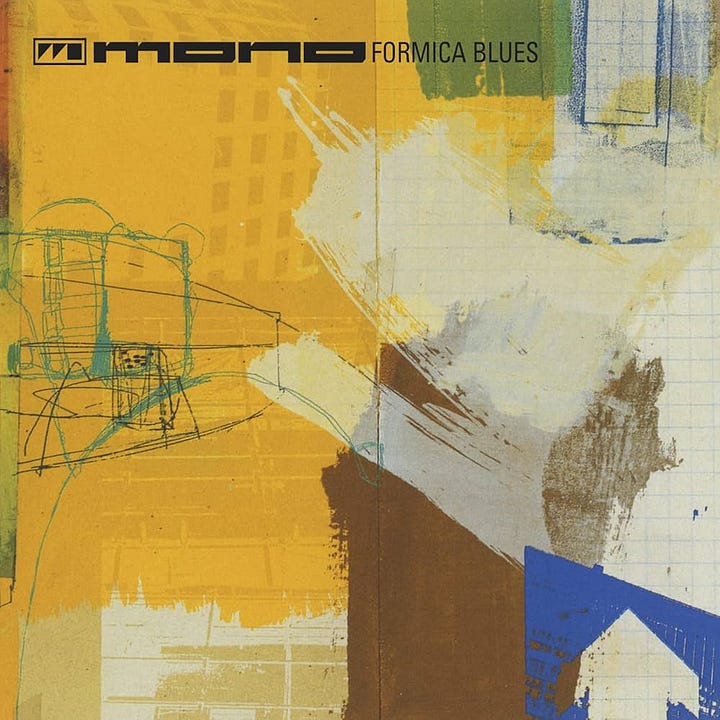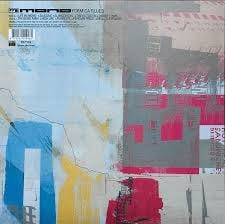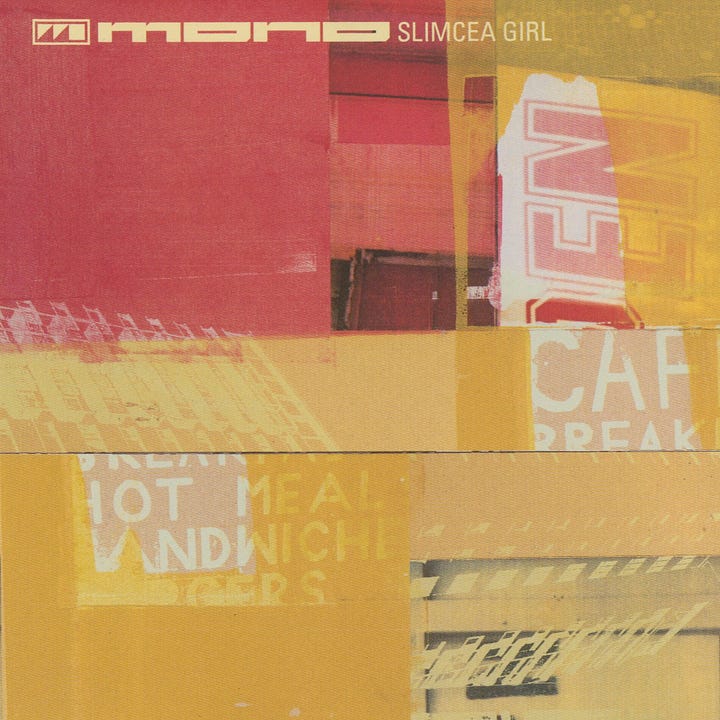It’s June, Summer is here. I got a new job which has sucked all the air from my side projects, and my time. But I am going to keep jamming. I love writing these and the travel is giving more time to listen to music. Huge playlists as I fly over the Rockies, albums saved for a rainy day are getting the air time (no pun) they need.
Project Updates:
MMLL (the bigger publishing project) is now officially hitting an iceberg of distraction and de-prioritization (I’m still looking for angels/investors to support independent music publishing - looking for someone to pay advances for issue 1 of a thing, so please do get in touch. Some seed money is definitely in need right now.)
MMR is in full flow, a new side business with physical products. Website is live, store is live, product is here. I have become packaging obsessed.
MMDI is officially on pause.
MMhealing sounds is also on pause - location fell through, needs a reboot.
desire.path is in happening soon.
This particular experimental project will evolve over time. I will try some new tunes and rediscover old albums, too. I may also try some themes and specific vibes, but definitely no requests. This is a smaller more focused tote bag of albums this month.
4 releases for June
Jeff Parker Quartet
The Way Out of Easy
International Anthem 2024
Jazz | very much Jazz
On December 23rd 2023, the Jeff Parker ETA Quartetet played their last ever show at an unassuming cocktail bar in Highland Park, Los Angeles. ETA was shutting down, thus ending their casual residency Parker and his band had been maintaining since 2016. It would be several months until they'd play again, as if they had only existed by the grace of this one stageless venue, and now its spirit was adrift.
Very few people outside of Highland Park would've ever felt that spirit, if it hadn't been for Bryce Gonzales. Formerly an audio engineer and now a full-time designer of recording equipment, Gonzales hardly ever missed a Monday show. "It started to bother me that I was enjoying the music but not recording it,” he writes in the liner notes for The Way Out of Easy. But he wasn't going to bring a computer or a heavy tape machine into a room that didn't even have a P.A. system. The modern ways of multitrack recording were the very reason he'd become alienated from studiowork, and so Gonzales set out to design a non-intrusive mixer for this very specific set-up. It's what makes this second live album to come out of the ETA shows (following the more fragmented Mondays at The Enfield Tennis Academy) so astounding: The Way Out of Easy is best understood through the selflessness of its most devout audience member, someone for whom there weren't enough Mondays in the week; someone who felt the need to completely reinvent his gear to do the music justice. "Making all the gear and the whole recording process disappear allows us all to be able to sit back, listen, and be in the same room as these four musicians as they spontaneously make music and don't even notice us there.
The title might suggest an escape from the past, but this isn’t music that runs from its history; it walks with grace, finding a joy in it’s repetition and hesitation. There are shades of Chicago’s improvised music lineage, but also minimalism of ECM, and a hint of Talk Talk’s Spirit of Eden in long tones and field sounds. The production is warm and tape-saturated, never polished, letting you hear the room, the sounds of the drinks being cleared. Artisanal Reality.
What stands out most, though, is Jeff Parker’s confidence. It feels deeply human, filled with pauses, stumbles, and recoveries. Parker for me has taught me that jazz isn’t a frozen genre, it’s a living feeling, and it’s finding new ways to speak in 2025. The Way Out of Easy glides gently into an uncharted territory of jazz, carrying a weight of history but avoiding nostalgia.
Marc Benno
Minnows
UMG 1971
Minimal | Folk | US
Why am I listening to Minnows in 2025? I can’t explain it entirely, and that’s part of the appeal. It’s not a record I should care about—an obscure early-70s solo album from a Texas session guy best known for playing second fiddle to bigger names. It’s not especially rare, or critically lionized, or in vogue. And yet, there’s something in the loose, analog charm of these songs that cuts through the overload of 2025. Maybe it's the way the record seems to drift in no particular hurry, content with being small and warm and slightly melancholy.
Released in 1971 on A&M, Minnows feels like a side glance at the golden era of American rock and soul. Benno slides between swamp-folk, mellow blues, and sunburnt pop with the kind of casual confidence that only comes from being around great music without trying too hard to impress. There's a half-asleep ease to songs like "Speak Your Mind" or "You’ll Lose a Good Thing" that reminds me of Leon Russell. But Benno is more subtle, more shy. The record doesn’t ask to be played loud. It just waits quietly until maybe you stumble on it.
In an era of overprocessed sound and intentional maximalism, Minnows has the restraint and warmth of something analog and unbothered. It makes me think of open windows, slow days, and music that doesn’t pretend to be important. There’s not a single track here that demands attention, and that’s precisely the spell it casts. It just sits in the room with you.
Maybe that's why I got so fixated on it. Not out of nostalgia. I wasn’t even alive when it came out, but because in a time of curated feeds and algorithmic excess, Minnows feels weirdly honest. Not brilliant. Not essential. But real and analogue.
Va
SENSE003
SENSE CODE 2025
Minimal Techno | Italy
Sense Code presents SENSE003, a finely curated four-track VA that merges depth with simplicity, echoing the essence of Italian sonic landscapes. Biocym, Feral, Formant Value, and Luigi Tozzi craft evolving textures of contemporary deep techno, reinforcing Sense Code’s commitment to refinement and immersion.
Continuing the incredible evolution of Italian techno SENSE003, Sensecode’s third release, is a moment of reflection and intent. Like its predecessors, this EP acts as a journal, each release distinct, but contributing to a common aesthetic of restraint, spatial awareness, and depth. Sense Code launched in 2023 with a clear mission: to create immersive, refined techno that nods to ambient and trance while keeping its feet on the dance floor. This third volume pushes that idea further, with four tracks that each push.
Formant Value’s “Deep Core,” premiered via Minimal Collective, is the standout here. Hailing from Terni, a post-industrial town in central Italy, his sound carries urban density balanced with delicate sensibility. Having released previously on Midgar and Delirio, his work consistently explores texture and repetition as ritual. “Deep Core” follows that path, layered with crisp percussion and a subaqueous atmosphere. It recalls the spiraling minimalism of Retina, it or the structure of Cio D’Or.
Feral, already well-known for his forest-rooted, dub-tinged output on Hypnus and his recent work on his own imprint, maintains his signature balance of mysticism and precision. His contribution here echoes his earlier tracks like “Heruka” or “Clandestine,” yet stripped even further back. Biocym, another rising voice, brings a deeply immersive cut that shares the textural sensitivity of artists like Neel or Artefakt, his attention to decay and low-end dynamics speaks to a thoughtful studio mind. Luigi Tozzi, the most established of this release, contributes a track that carries his unmistakable fingerprints: sweeping atmospheres, tectonic pulses, and a sense of negative space. Tozzi’s presence lends a presence to the record, anchoring it to a Roman school of deep techno I can’t get enough of.
What binds all four artists, and what defines SENSE003 as a whole, is an interest in techno not as genre, but as a space to explore psychoacoustic responses, build tension through tones rather than drops. Across the series so far, Sense Code has maintained a steady growth curve: SENSE001 was an ethereal mission statement. The label isn’t trying to create moments for DJ sets; it’s shaping releases for listening. Each volume feels like a page in an unfolding manifesto. If the Italian landscape has long produced thoughtful, minimalist techno, Sense Code is helping define what that can mean today.
Vernon Spring
Under a familiar sun
Lanuga Fur 2024
Minimal | Jazz | Ambient | UK
Under A Familiar Sun feels to me like a record made out of memories, not nostalgia, but an emotional blanket. The Vernon Spring, the solo project of Sam Beste (formerly of Hejira, collaborator with Amy Winehouse and Matthew Herbert), brings a quiet harshness to his piano work. But this time the music feels more hushed, less performative, like a warm summer breezes. The record is gentle, and soft. A still lake on Mt hood that is refusing to reflect the sky the way you expect to see. It's built on minimal tools: piano, ambient hiss, snippets of conversation, occasional feather-light electronics.
There’s warmth in the crackle, in the way the notes bloom and dissolve, as if recorded at a home, in between evening conversations. What sets The Vernon Spring apart from other ambient-piano composers is an attention to a world beyond the music. You can hear his political sensitivity in the spaces he leaves open, in the titles, in the interludes that blur voice and piano. There’s a lineage here with artists like Max Roach or Julius Eastman, experimentation becomes a kind of protest against slickness, against forgetting. He’s said in past interviews that he's not interested in celebrity, but in what music can mean when it’s pared back, vulnerable.
Under A Familiar Sun isn’t a background album, though it might whisper like one at first. It’s a work that invites you to sit with it, let it slow your breathing, remind you what it feels like with no phone. In a year full of maximalist ads and political bombast, this is a record that dares to be subtle. It belongs in the same conversation as Hania Rani, or Akira Kosemur
Mono
Formica Blues
Echo 1997
Trip-Hop | Downbeat | Lo-fi | UK
Always loved the art direction of the Mono releases.




The tracks are on all the usual streaming services (try to avoid Spotify) - but this below is four tracks - demos recorded for an unreleased 2nd Mono LP.
The last one is a throwback. Formica Blues is one of those records that exists out of time. Released in 1997 on Richard Branson’s short-lived Echo label, Mono's only full-length album arrived just as the first wave of trip-hop was beginning to die out. Portishead had defined the genre’s shadowy class, while Massive Attack had begun mixing things into something darker and less beat-driven. Mono arrived late, but brought a different kind of precision, more cinematic, architectural in its design.
Opening with Life in Mono, all breathy vocals, dusty harpsichord loops, and minimalist beatwork found their way into film soundtracks and TV dramas. But the rest of the record reveals something much more ambitious. Slimcea Girl and Hello Cleveland! fold references to ‘60s spy film scores, library music, and musique concrète. Tracks unravel with narrative arcs, field recordings, and changes in perspective. Martin Virgo’s arrangements are meticulous, built from analog synths, live strings, and nods to Debussy and Delia Derbyshire. Singer Siobhan de Maré floats above it all, part singer, part ghost.
What’s remarkable about Formica Blues in hindsight is how much it resisted the expectations of its time. It didn’t lean heavily on hip-hop beats or dubby bass. It didn’t aim for club culture. Instead, it played with memory, cinema, and emotional ambiguity. It's more in line with Air’s Moon Safari or David Axelrod than with Tricky or DJ Shadow. Formica Blues has aged far better than many of its peers, partly because it was never really of its time to begin with. It exists in a velvet-curtained smoky lounge playing softly on a reel-to-reel, waiting to be discovered.
Peace, more soon.
All albums are listed on Record Club if anyone is playing with that right now.


